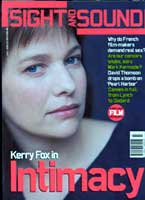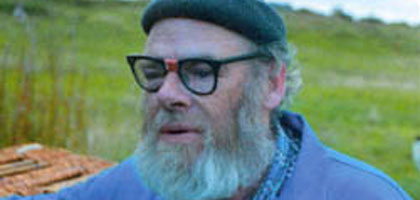
Like Father
UK 2001

Reviewed by Richard Kelly
Synopsis
Our synopses give away the plot in full, including surprise twists.
Elderly ex-coal-miner Arthur Elliott (Ned Kelly) keeps pigeons by the East Durham coast, but is asked to relinquish his allotment to local-authority plans for redevelopment. Arthur has a strained relationship with his son Joe (Joe Armstrong), another ex-miner who scrapes a living as a club singer, music teacher and variety agent. Joe's workload and excessive drinking estrange him from his wife Carol (Anna Gascoigne) and young son Michael (Jonathon Dent). Joe's old friend David Hylton (Derek Walmsley), head of the redevelopment scheme, commissions Joe to compose a brass-band score. The extra work puts further strain on his marriage. Carol asks Joe to leave, and he moves into a caravan.
Arthur's friends gradually submit to the council's plans, and he grows embittered. His friend Willie (Willie Ross) tells Joe that Arthur loved music before the early death of his other son, also called Michael. David asks Joe to persuade Arthur off his allotment. Instead Joe abandons his commission. Arthur lures David to the allotment and threatens him with a shotgun. Joe arrives and intervenes. In the melee, a watching Michael is hurt, but the three Elliotts are finally reconciled.
Review
With its grave natural beauty and rich industrial history, the East Durham coast has attracted a lot of movie cameras down the years. Blackhall Rocks is where Michael Caine sent Ian Hendry to his maker at the end of Get Carter (1971). At Easington Colliery, in the grim aftermath of the miners' strike, Alan Clarke made his magnificent television film of Jim Cartwright's Road (1987). And several years after coal-mining in Easington was finally killed off, Billy Elliot danced away to better things down the terraced streets of the pit village.
Though the family in that film seemed to do miraculously well for themselves, the truth about those close-knit communities is that they are still subject to terrible deprivation. 'Regeneration' is now the governmental buzzword. Backed by EU money, a Durham-based public-private partnership has been shifting debris from beaches to make the coast more appealing to would-be investors and imagined tourists. For Easington Colliery, meanwhile, the future may reside in museums of polished mining memorabilia.
The human cost of these endeavours is the focus of Like Father, the latest work from Amber Films, a Newcastle-based collective established in 1969 with the aim of documenting working-class lives. They work patiently and carefully on low-budget labours of love, set in real places and drawn from true experiences. Their research in the villages of the East Durham coalfield previously led to Eden Valley (1994) and The Scar (1997). Having interviewed umpteen local people about their lives since the pit closures, they constructed the story of Like Father and cast it largely with non-professionals.
The struggle of ex-miners to save their pigeon crees from the bulldozers is a real one. Jackie Surtees, one such campaigner, effectively plays himself here. Meanwhile, the slick figure of David Hylton, played by Derek Walmsley, exemplifies the film's criticisms of how ambitious boys in local government will clamber over long-term residents in pursuit of their 'best interests'. Seated around an allotment stove, making tea and roll-ups, the elderly 'pigeon men' scorn council lackey Brian and Hylton's Phoenix project, with its pipe dream of future tourists flocking to the spot from which the pigeons have been cleansed. Later, as the wrecking crews roll in, ex-pit worker Arthur, whose allotment is threatened by Hylton's plans, brands Brian a 'scab', and the epithet is seen to retain every bit of its sting.
The non-professionals in Like Father are so good that the handful of 'real' actors look a bit uncomfortable. The film is powered by the splendid Joe Armstrong (who contributed music to The Scar) as Arthur's son Joe, never more affecting than when seeming to be himself: cracking jokes over a pub pool table, affably teaching music to a MENCAP class, or on stage at the Victory Club in Horden, serenading drunken fans of Sunderland F.C. His big break-up scene with his wife Carol is blocked a little awkwardly, but it builds to real pathos as Joe's heavy sobs are observed from behind a banister by his son Michael.
Like Father is unabashedly concerned with intergenerational, crisis-hit masculinity. Michael starts to disdain his beleaguered dad for the company of the pigeon men (there's a tremendous moment when a distressed Jackie hands down his cherished catapult to the boy). But the old men have their own failings. Monochrome flashbacks confirm that Arthur was fond of bashing out a song at the piano until the untimely death of his own son Michael, whereupon he throttled Joe's musical aspirations.
Some of the later plot-carpentry feels a tad forced, as when Michael overhears Joe being advised by David to have a word with his dad, lest there be 'less money for other things'. The finale too, bringing all the men together to shout and scuffle, is overtly engineered. But there is great power in the solidarity that emerges between Arthur and Joe. Earlier, when Michael finds his uncle's grave and is cruelly taunted by his mates, Jonathan Dent bravely conveys the anguish.
The camerawork makes some fine, rosy snapshots of East Durham's beaches and denes, and there is one marvellous sequence of racing pigeons taking flight. The production is dedicated to the comic Willie Ross, who died of a brain haemorrhage during filming. Like Father permits Ross fans one lovely last chance to cherish his cock-eyed, stiff-legged imitation of inebriation. For this and umpteen other reasons, Like Father is a genuine treasure, worth ten of Billy Elliot.
Credits
- Directors
- Amber
- Producers
- Amber
- Screenplay
- Amber
- Directors of Photography
- Amber
- Editors
- Amber
- Art Director
- Irena Pietruszka
- Original Music
- Joe Armstrong
- Incidental Music Composer/Arranger
- John Alder
